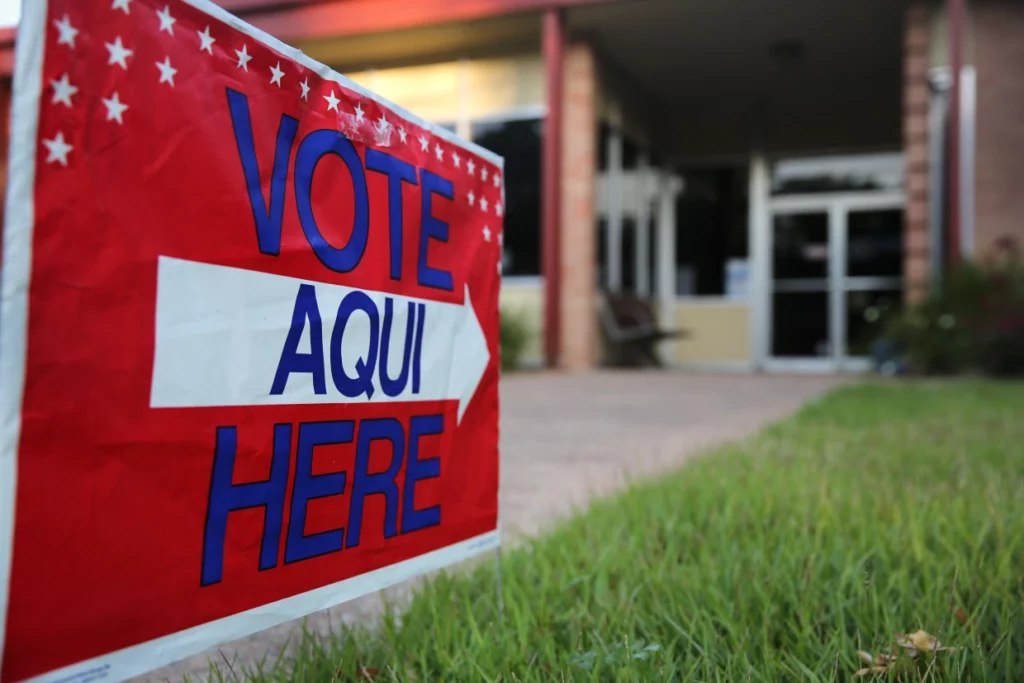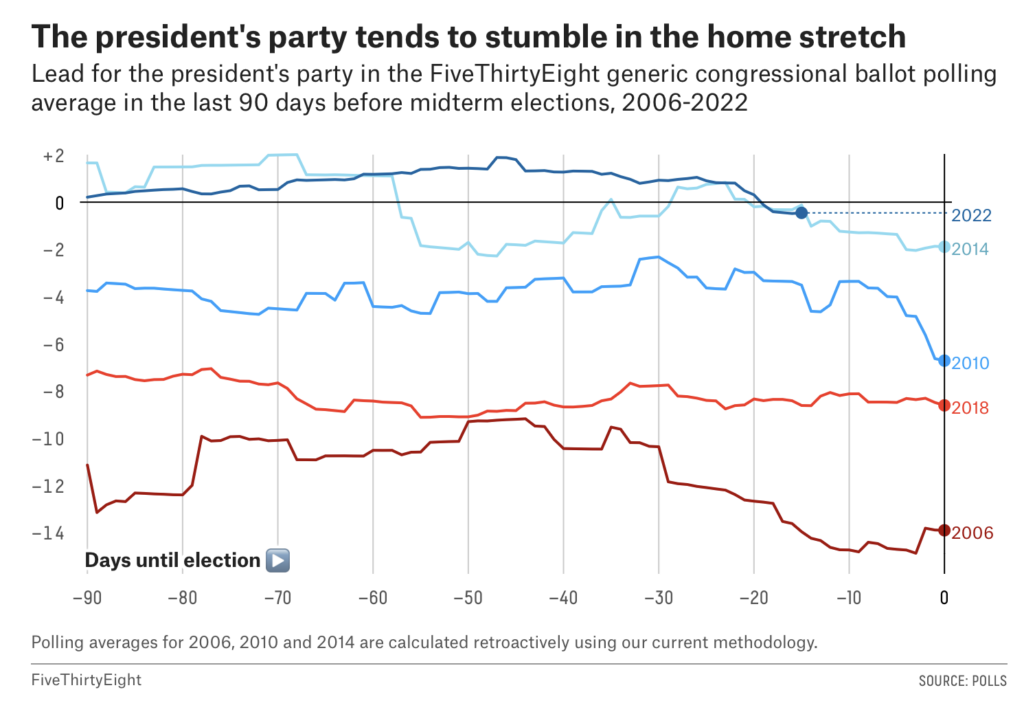Mid-Terms Polling Shows Mid-Term Pattern
The party in the White House is likely to lose seats.

FiveThirtyEight’s Nathaniel Rakich reports: The Polls Are Getting Better For Republicans. The heading of the piece notes, “It is a midterm year after all.”
As we know, the historical pattern in the US is for the president’s party to do poorly in mid-term elections, especially in their first term. This is attributable to any number of key factors, not the least of which being that voters tend to be fairly simplistic in their assessment of the government and treat elections of this nature as about the president on the mistaken proviso that whatever is happening in the country is the president’s fault, at least to some degree. This is especially true if the country is experiencing any kind of obvious problem like, well, generational levels of inflation as the global economy recovers from the effects of a worldwide pandemic.
You know, that sort of thing.
Further, it is generally the case that the opposition party is more energized than the president’s party because they just lost a mere two years ago and want the chance to register their views on the sitting president.
Additionally, many voters who voted for the sitting president will be disappointed because it is literally impossible for any given president to have accomplished everything all the voters expected that president to accomplish. Put another way: any given president starts disappointing someone (indeed, a large number of someones) the minute they are inaugurated (indeed, even before that).
The current movement in the polling tracks with these expectations:
This change has affected FiveThirtyEight’s midterm forecasts too. Democrats’ chances of holding onto Senate control have fallen from 66-in-100 on Oct. 13 to 55-in-100 today. And Republicans have gone from having a 69-in-100 chance of flipping the House on Oct. 13 to an 80-in-100 chance today.
To be clear: a 55% chance is a very real chance that the Democrats will hold onto the Senate. For that matter, things with a 20% chance of happening happen all the time (20% of the time, in fact!) so a Dem hold is not impossible (but I certainly wouldn’t bet the house on it, nor, I guess, the House).
Regardless, the polling shifts away from the president’s party are also part of a standing pattern:

Granted, 2022 has been an exceptionally good mid-term for the president’s party on the generic ballot polling, perhaps owing to our increased polarization and to the nature of the party conflict at the moment (i.e., Trumpism and all that that encompasses).
Rakich attributes a good bit of that to Dobbs, which is a reasonable assumption:
But that doesn’t mean the Dobbs decision didn’t make a difference. Take another look at that graph. The 2022 line (along with the 2014 line) is at the very top of the chart. In other words, Democrats may lose ground from here on out, but they are starting from a higher baseline than usual. And without the boost Democrats received over the summer, we may have been forecasting a so-called “red wave” — a Republican landslide of 6-10 points. While the possibility of another polling error in Republicans’ favor means that outcome is still on the table, it’s more likely that 2022 will be a more modest Republican victory. For Democrats, it could have been a lot worse.
I would add, too, that if the GOP had nominated less controversial (dare I say, normal) candidates in GA, NH, OH, and PA, I don’t expect we would be having any kind of real conversation about the Democrats maintaining control of the Senate.
Certainty turnout will matter, as I think there are reasons to assume that turnout will be higher this cycle than normal. As such, the polling models could be off. Still, as we have known from the beginning of Biden’s term, we seem to be clearly heading where we thought we were heading: a loss of seats for Democrats.






At one point I held some hope. That’s gone.
I think a lot, these days, of the men in those boats crossing the frozen river at Trenton and how disappointed they would be in us.
There are various “fundamentals models” that attempt to analyze or predict elections ignoring party, platform, and personality. Most, I think, look at incumbency and some selection of econ indicators. That they work pretty well is one of those things that makes one wonder if democracy is possible.
It used to make less difference when R v D meant a couple percent on the Defense budget increase or who’d get appointed to the NLRB or which centrist would be unanimously confirmed to the Court. From the Great Depression Ds dominated politics for a long time and Rs had to function as a minority party, not deviating too far from the norm. That’s what drove the policy continuity. But now the same rules seem to hold when it’s the survival of representative democracy at stake.
IIRC having a dominant party has been the historical norm. And the impact of cell phones aside, a polling or modeling error of a few points was easily forgiven when it meant Johnson won by 23 points instead of 20. Those were the good old days. At least for a leading edge boomer like me.
Historically there’d be no reason to be concerned at a change of party control of Congress in the midterms. Even if we know the objective of the GQP will be to establish gridlock and try to tear Biden down.
These days, and given the turn the GQP has taken, my concern is that eventually a midterm or general election will be the last. That is, minority rule will become permanent and elections will be mere spectacles for the masses, as devoid of meaning as pro wrestling.
If that turns out to actually fit the historic pattern with the Dems losing both chambers, then we can pre-write the headlines, explanations, and rationalizations now – we will have heard them a million times, and they boil down to:
– Democrats will say they did better than expected and that it doesn’t implicate any of their policies or decisions, or maybe that the electorate was misinformed by GoP lies. (Although the Democratic Socialist faction will say losing is the result of Manchin and the party not going hard left on policy).
– Republicans will call this a “wave” regardless and tout it as the complete repudiation of Biden and the Democratic agenda.
The one thing that I keep in the back of my mind is that in order for the Reps to legislate all the terrible things they want to, they’ll have to do so with a veto-proof majority.
That’s unlikely to happen.
@Mu Yixiao: That’s true, however it only takes a bare majority to bollocks up the government by spending time impeaching Biden (over what, we do not know), hauling Hunter Biden in front of committees, failing to fund the government over and over, etc.
God help us all if the Senate flips and one of the Supremes has an untimely end. Absolutely f*cking nothing will get done.
Again I can only wish for a very effective lame duck session, raising the debt ceiling to a gazillion, funding Ukraine for a few years, and maybe figuring out a way to make continuing resolutions continue until affirmatively changed.
Set the government up to coast for two years.
Also, I want Hunter Biden to snort lines of coke while testifying before the inevitable “investigations.” I mean, if he’s still doing drugs. I don’t want the guy to have a relapse.
@Jen:
Does it matter? Whatever pretext they use doesn’t even have to be real. They’ll impeach him three times for whatever bullshit they pull out of their collective ass, just so he’s impeached one more time than the orange baboon.
@Jen:
@Mikey:
1) Cheating Benito in the 2020 election
2) Establishing worldwide inflation
3) Cheating Benito in the 2024 election
I am reminded of the old stock broker disclaimer “Past results are no guarantee of future performance.” The problem with doting on past trends is that no election occurs in the past. And the circumstances of this election are virtually unique, having no parallel here in the last century.
By now, all the horse race BS is lots of heat and damn little light. I’ll vote and then wait and see if I need to contact my relatives in Canada.